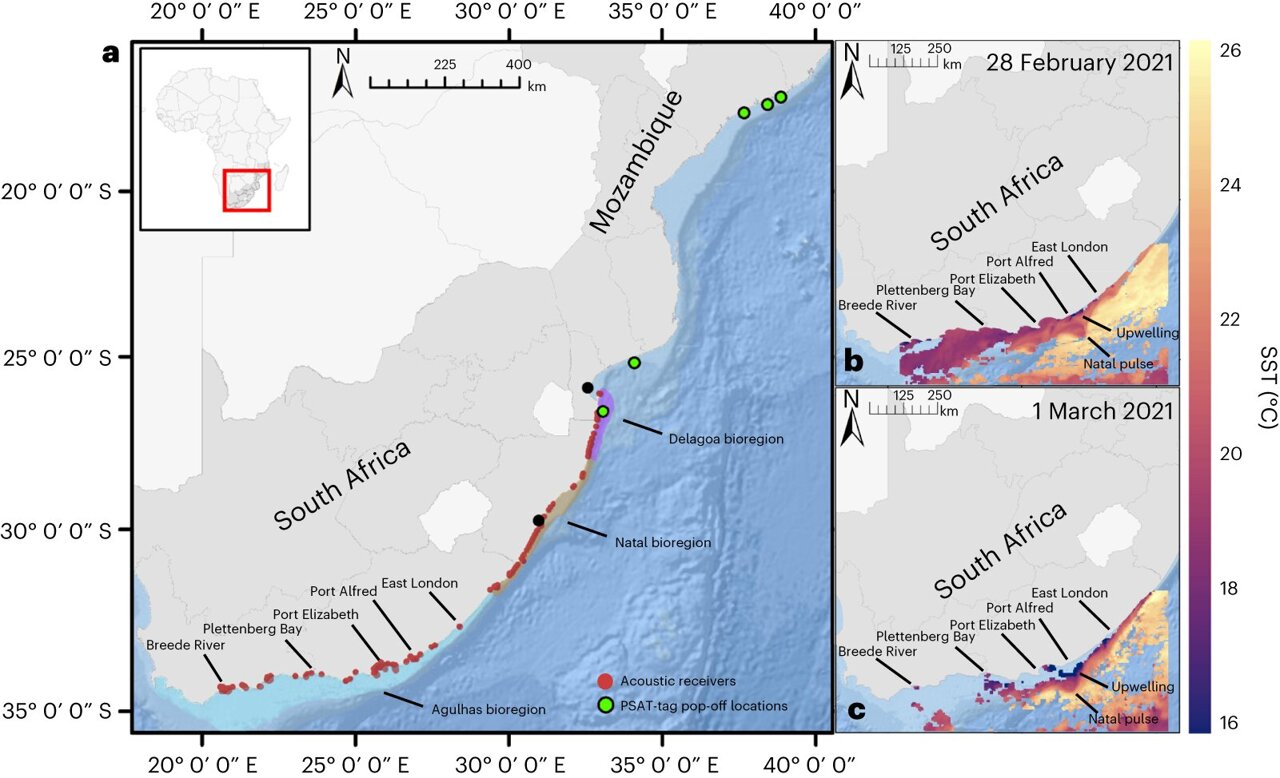Anatomy of a Cold Event
a, The map of southern Africa displays crucial coastal locations and the acoustic receiver array used to monitor the movements of acoustically tagged bull sharks. b, A satellite image from Aqua MODIS SST data on 28 February 2021 reveals an inshore eddy, known as a Natal pulse, off Port Alfred, with a small upwelling cell forming. c, Another satellite image from Aqua MODIS SST data on 1 March 2021 shows the Natal pulse further south along the coast, with a larger upwelling cell visible between Port Elizabeth and East London, South Africa. Source: Nature Climate Change (2024). DOI: 10.1038/s41558-024-01966-8
Tropical marine species exploring new territories due to climate shifts may face an unexpected threat—sudden cold water surges from the deep sea that can prove fatal.
A recent study led by Nicolas Lubitz from James Cook University delves into upwelling events, where surface waters are displaced from the coast, allowing cold water from the depths to rise. This research is featured in the journal Nature Climate Change.
Lubitz and his team investigated an extreme upwelling incident that occurred on the south-east coast of South Africa in 2021.
“On March 2, 2021, the shores of South Africa witnessed the arrival of over 260 carcasses from 81 species, including sharks, manta rays, and trevally, along a 230-kilometer stretch from Port Elizabeth northward,” shared Dr. Lubitz.
Dr. Lubitz explained, “Satellite data and surface observations confirmed an upwelling event on March 1st in the region.”
He noted that upwelling cells are becoming more pronounced due to climate change-induced alterations in pressure systems and [ missing text].
missing text].
“We analyzed the patterns of upwelling frequency and intensity in the Agulhas Current in the Southern Indian Ocean and the East Australian Current—and observed an increase in both the frequency and intensity of cold events,” Dr. Lubitz added.
Source: Nature Climate Change (2024). DOI: 10.1038/s41558-024-01966-8
Marine Life Affected by the Upwelling Event
A selection of fish and elasmobranch carcasses that washed ashore during the intense upwelling event between 2 and 7 March 2021 along local beaches between Port Elizabeth and north of East London. a, Galeichthys sp. b, Caracharhinus leucas. c, Carcharhinus sp. d, Mobula sp. e, Various cephalopods and teleosts, including Caranx sexfasciatus. f, Triodon macropterus. Source: Nature Climate Change (2024). DOI: 10.1038/s41558-024-01966-8
As oceans warm, marine species are shifting their ranges towards the poles. However, they may encounter new hazards through sporadic yet severe upwelling events that seem to be growing in frequency and intensity at these new distributional boundaries.
“Our findings indicate that the intensification of upwelling driven by climate change could elevate the occurrence of lethal cold events for migratory subtropical marine megafauna,” Dr. Lubitz emphasized.
He highlighted the potential repercussions of heightened cold events and the intricate impacts of climate change on marine ecosystems, where despite overall ocean warming, shifts in currents and winds can trigger brief yet intense cold spells.
For more details, refer to the study by Nicolas Lubitz et al, titled “Climate change-driven cooling can kill marine megafauna at their distributional limits,” published in Nature Climate Change (2024).
Citation:
“Climate-change-driven cold snaps threaten marine life” (2024, April 16)
Retrieved on 16 April 2024 from https://phys.org/news/2024-04-climate-driven-cold-snaps-threaten.html
Copyright restrictions apply to this content. It is provided for informational purposes only.
